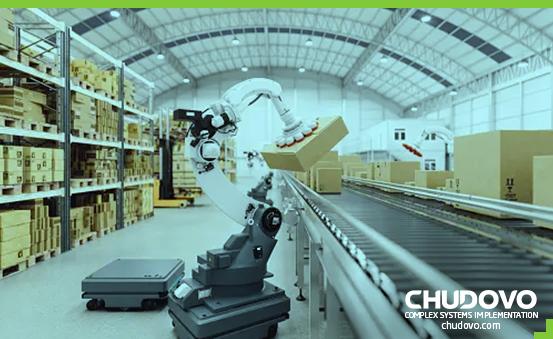
The Future of Logistics and Supply Chain industry: 25 AI Use Cases and Applications Disrupting the Industry in 2023
In today’s highly fast-paced world, supply chain management is more critical than ever. As e-commerce continues to boom, businesses need to keep up with the demand for fast and efficient delivery. But how can they ensure their supply chain keep up? This is where AI in logistics comes in – a game-changer for the logistics industry that is revolutionizing the way people move goods from one place to another.
AI in logistics refers to the use of artificial intelligence and machine learning to streamline and optimize the supply chain process. From process mining to customer service, data collection to logistics services, AI is transforming every aspect of the supply chain. But what are the advantages of AI in logistics? What are the benefits and drawbacks? What are the AI use cases and applications used in the supply chain industry? How is AI changing the logistics industry in 2023?
One of the primary advantages of AI in logistics is process automation. AI algorithms can automate routine tasks, freeing up time for logistics professionals to focus on more strategic aspects of their job. Additionally, AI can help identify inefficiencies in the supply chain, allowing companies to optimize their operations and save costs. On the other hand, concerns have been raised about the use of synthetic data in training AI models and the potential impact of autonomous vehicles and other autonomous things on the logistics industry.
In this article, however, we’ll not only attempt to answer all the questions raised above but also look at how AI is solving common supply chain problems and
comprehensively explore the exciting use cases and applications of AI in logistics and examine how they are transforming the industry in 2023.
Let’s get started!
Table of content
- Exploring the Pros and Cons of AI in Logistics and Supply Chain
- Pros of AI in Logistics and Supply Chain
- Cons of AI in Logistics and Supply Chain
- Common supply chain problems and AI solutions to them
- 25 AI Use Cases and Applications transforming the Logistics Supply Chain industry in 2023
- Conclusion
- FAQs

Exploring the Pros and Cons of AI in Logistics and Supply Chain
It is a known fact that AI is one of the most promising technologies for the logistics industry in recent times, with the potential to revolutionize the supply chain processes, increase efficiency and save time and money. However, as with any new technology, there are potential pitfalls and concerns about the potential risks associated with AI in logistics and supply chain. Here, we will explore both sides of the argument and consider the pros and cons of AI in the logistics industry.
Pros of AI in Logistics and Supply Chain
- Improved Process Automation: AI can help to automate processes and reduce the amount of manual intervention needed in the logistics and supply chain process. This can help increase the accuracy and efficiency of operations, resulting in increased productivity and lower costs. AI can also be used to process and analyze large amounts of data more quickly, allowing process optimization and improved decision-making capabilities.
- Improved Customer Service: AI can help to improve customer service by providing faster response times and more accurate information. AI-powered chatbots can provide quick, personalized responses to customer inquiries, reducing wait times and providing a better overall customer experience.
- Increased Efficiency and Accuracy: AI can improve the accuracy and efficiency of logistics and supply chain processes by analyzing large amounts of data in real-time thus fast-tracking the process of decision making. This can improve the visibility of supply chain operations and minimize delays. AI can also provide predictive insights into future demand and supply-chain problems, helping to mitigate anticipated risks.
- Improved Data Quality: AI can help to improve the quality of data being collected and analyzed, as well as reduce the risk of errors and omissions. Data collected by AI are more accurate, which can help reduce costs and eliminate costly and time-consuming mistakes.
- Enhanced Autonomous Technologies: AI can be used to power autonomous vehicles and things, allowing more efficient and accurate delivery of goods, as well as improved inventory management and optimization.
Cons of AI in Logistics and Supply Chain
- High Cost: Implementing AI technology in logistics and supply chain operations can be expensive, as it requires significant investments in hardware, software, and employees who have the necessary expertise to use the technology.
- Lack of Transparency: As AI-assisted technologies are still in the early stages of development, there are still some issues with transparency. There is a concern that decisions and actions taken by AI-powered systems may not be as transparent as they need to be.
- Data Privacy and Security Risks: With the large amounts of data needed to power AI-driven technologies, there is the potential for data to be compromised. Companies must ensure that their data is secure and maintain the privacy of customers if they wish to benefit from the technology.
- Lack of Diversity: AI relies on data sets to learn and make decisions. If the data sets are not diverse or robust enough, AI can make biased decisions. This can be a problem if logistics and supply chain operations are using AI to manage inventory or route goods.
- Dependency on Synthetic Data: AI-driven technologies depend on the availability of high-quality data for optimal performance. Without this data, performance could suffer and lead to unexpected results. Companies must ensure that the data required for AI-driven technologies are sufficiently diverse and complete.
That being said, AI is a promising technology that offers many advantages as well as some disadvantages for the supply chain and logistics industry. Companies considering the use of AI technology should weigh these pros and cons carefully before investing in them and seek professional consultation from experienced AI & Machine learning think tank like Chudovo so as to ensure optimal outcomes for their business.
Common supply chain problems and AI solutions to them
The global supply chain is a complex web of interconnected processes that involve numerous parties, including manufacturers, suppliers, logistics service providers, and retailers. With so many moving parts, it’s no surprise that supply chain problems are common. Fortunately, the advent of artificial intelligence (AI) is transforming logistics and supply chain management. Here are 12 common supply chain problems and how AI solutions can help.
- Insufficient Real-time Data: AI-driven data collection and process mining help uncover problems and potential solutions in real-time and make it easier to identify and resolve supply chain disruptions.
- Quality Data Collection: By leveraging synthetic data, AI ensures that companies are provided with reliable, accurate, and quality data for making supply chain decisions.
- Poor Inventory Management: AI-powered inventory management tools, such as demand forecasting and stock-level optimization, enable companies to better manage their inventory and anticipate customer demands.
- High Transportation Costs: AI-based logistics services help companies to reduce transportation costs by finding the most cost-effective routes and providing optimized deliveries.
- Capacity Planning: AI-driven capacity planners reduce manual efforts and provide real-time insights into customer demands, shipments, and inventory levels, ensuring a smooth process flow.
- Outdated Technology: Through machine learning and autonomous things, AI helps companies to stay updated on the latest supply chain practices, which further enhances customer service.
- Delays and Unreliable Service Providers: AI-powered delivery trackers provide reliable data, enable better customer service and help companies to perform on-time deliveries.
- Fraud and Theft: AI helps to identify fraudulent activities and leaks in the supply chain, allowing companies to spot theft or losses quickly and reduce losses.
- Inefficient Processes: AI-driven process automation and autonomous vehicles help companies to streamline their supply chain processes, making them faster and more efficient.
- Lack of Transparency: AI-driven supply chain transparency system allows companies to monitor the entire supply chain process from end to end, ensuring quick resolution of issues and reducing delays.
- Poor customer service: AI-powered chatbots and virtual assistants can provide customers with 24/7 support, improving customer satisfaction and reducing the workload of customer service teams.
- Lack of visibility: AI-powered analytics can provide real-time visibility into the supply chain, enabling organizations to identify bottlenecks and take corrective action.
25 AI Use Cases and Applications transforming the Logistics & Supply Chain industry in 2023
As we speak, AI technologies are already been deployed in various Logistics & Supply Chain use cases, making them an invaluable tool for improving efficiency in the industry. Here is a comprehensive look at the 25 most popular AI use cases and applications transforming the Logistics & Supply Chain industry in 2023.
First of all, we will list them out then we begin to explain them one after the other.
- Process Mining
- Supply Chain Optimization
- Service Providers
- Process Automation
- Autonomous Vehicles
- Predictive maintenance
- Demand forecasting
- Warehouse management
- Route optimization
- Last-mile delivery
- Inventory management
- Quality control
- Supplier risk management
- Freight matching
- Automated document processing
- Carrier selection
- Energy optimization
- Sustainability tracking
- Order management
- Real-time tracking and visibility
- Autonomous vehicles and drones
- Robotic process automation
- Predictive analytics
- Synthetic data generation
- Fraud detection and prevention.
1. Process Mining
Process Mining is a technology that uses Artificial Intelligence (AI) to automatically track and analyze data related to business processes. It enables supply chain companies to understand their processes better and optimize them for maximum efficiency. Process Mining can also be used for forecasting, analyzing customer data, and predicting future trends. Additionally, it can be used to identify bottlenecks and weak points in the supply chain, allowing companies to make quick decisions and optimize their processes accordingly.
2. Supply Chain Optimization
AI can be used to optimize the supply chain by analyzing large amounts of data and developing an actionable model. It can track and measure the performance of the supply chain and identify any potential risks or areas of improvement. AI can also be used to measure customer responsiveness, order fulfillment, and inventory management.
3. Service Providers
AI is being used to automate the services provided by third-party companies. For example, AI can analyze a large dataset to generate insights on customer behavior and suggest value-add services. It can also be used to develop strategies that help companies better manage supplier relationships and reduce supply chain risk.
4. Process Automation
AI can be used to automate and streamline routine logistical tasks like packing and labeling orders, shipping items, scheduling deliveries, and tracking logistics. AI technology also allows for predictive analysis of customer data to better anticipate customer needs and automate the fulfillment process.
5. Autonomous Vehicles
Autonomous vehicles are being developed to transport goods, saving time, money, and resources. AI can be used to power these vehicles and make them smarter, safer, and more efficient. Autonomous vehicles can reduce the need for manual labor and make the supply chain more efficient and cost-effective.
6. Predictive Maintenance
AI-enabled predictive maintenance can be used to track and measure the performance of the logistics and supply chain. AI-driven analytics can be used to identify potential breakdowns before they occur and reduce the costs associated with unscheduled repairs.
7. Demand Forecasting
AI can be used to analyze customer and market data to generate predictive forecasts and demand patterns. AI solutions can also be used to develop an accurate inventory management plan, which can help to prevent over-ordering or under-ordering of certain items.
8. Warehouse Management
AI can help to improve warehouse efficiency by optimizing product storage and tracking inventory levels. AI can also be used to automate receiving, packing, and shipping processes, which can help save time, money, and resources.
9. Route Optimization
AI analyze customer data and creates the most efficient route for deliveries. AI-driven route optimization helps to reduce turnaround times and improve customer satisfaction.
10. Last-mile Delivery
AI is effective in streamlining last-mile delivery services by creating tailored delivery options, such as same-day delivery. AI can also be used to analyze customer data to create personalized delivery routes and reduce the time and cost associated with last-mile delivery.
11. Inventory Management
AI helps to analyze and optimize inventory levels, predicting that demands and margins can be improved through proactive supply management. As we have said earlier, It can also be used to improve demand analysis and forecasting, in order to reduce inventory costs.
12. Quality Control
AI can be used to automate the quality control process by monitoring, analyzing, and inspecting products. It can also be used to identify any defects or faults in order to ensure the highest quality of goods.
13. Supplier Risk Management
AI can analyze supplier information to create a comprehensive risk profile. Through AI-driven analytics, it is possible to identify potential risks with suppliers earlier and help to reduce the risk of supply chain interruptions.
14. Freight Matching
AI can match freight with the best available carriers and negotiate better transport costs. It can also be used to optimize and streamline the booking and tracking process, improving customer satisfaction and reducing turnaround times.
15. Automated Document Processing
AI is effective in automating document processing by scanning and converting documents into digital format for faster retrieval and storage. It can identify documents and cross-check them for accuracy, eliminating costly manual data entry.
16. Carrier Selection
AI can be used to analyze past performance and customer feedback to select the best carrier for the job. AI-driven algorithms can also be used for competitive bidding, making it easier to select the most cost-effective carrier for the job.
17. Energy Optimization
AI can optimize energy use in warehouses and other supply chain facilities and also track and analyze energy consumption data in order to identify inefficiencies and reduce energy costs.
18. Sustainability Tracking
AI technology can track and monitor the environmental impact of logistics and supply Chains on a global scale and use the resulting analytics to identify best practices and potential improvements in order to create a more sustainable supply chain.
19. Order Management
AI is designed to automate order processing and optimize routing in order to improve efficiencies and reduce delivery time. It can also develop order profiles, recognizing customer demands, preferences, and usage history to improve customer satisfaction.
20. Real-time Tracking and Visibility
AI can be used to develop real-time tracking and visibility platforms, providing customers with up-to-date information about their orders. AI-driven trackers can be used to monitor incoming shipments, detect potential delays, and automatically notify customers about the status of their orders.
21. Autonomous Vehicles and Drones
Autonomous vehicles and drones can be used to improve last-mile delivery services for customers. Autonomous vehicles reduce the need for manual labor and make the supply chain more efficient and cost-effective. Drones can also be used to deliver goods within shorter distances, eliminating the costs associated with traditional transportation.
22. Robotic Process Automation
AI can be used to automate routine logistics operations such as data entry, labeling, and packaging tasks. By automating these processes, robots can eliminate mistakes and improve accuracy, saving time and money.
23. Predictive Analytics
AI can be used to develop predictive models to anticipate future customer demand and help organizations plan their supply chain accordingly. AI-generated models can analyze customer trends to detect any potential problems and generate actionable insights that can help to prevent disruptions in the supply chain.
24. Synthetic Data Generation
This involves developing synthetic datasets that can be used to train and improve AI systems. By creating synthetic datasets, AI can learn from its mistakes and improve its accuracy and performance over time.
25. Fraud Detection and Prevention
AI can be used to detect and prevent fraud in the logistics and supply chain industry. This is done by analyzing customer data and identifying any irregularities or suspicious activity, thus helping companies reduce the risk of fraud and protect their customers.
Thus, it can be seen that Artificial Intelligence is already revolutionizing the logistics and Supply Chain industry in a variety of ways. By automating routine tasks and processes, AI can reduce costs and improve customer satisfaction. Additionally, by analyzing large amounts of data and providing predictive insights, AI can help optimize the supply chain and provide the necessary competitive edge. As AI continues to evolve, it has the potential to dramatically shape the logistics and supply chain industry in the years to come.
Conclusion
As we speak, the future of the logistics and supply chain industry is already being revolutionized by AI in 2023 in ways that we’ve never seen before. With the integration of artificial intelligence, logistics, and supply chain operations can become faster, more efficient, and cost-effective. The 25 AI use cases and applications discussed in this article provide a glimpse of what is to be seen and how AI is poised to disrupt the industry in the coming years.

Certified engineers
Convenient rates
Fast start
Profitable conditions
Agreement with
EU company
English and German
speaking engineers
AI in logistics brings numerous advantages, including process automation, improved customer service, data collection, and supply chain optimization. Logistics service providers can leverage synthetic data and machine learning algorithms to improve route planning, reduce delivery times, and increase accuracy. Autonomous vehicles and drones can also be used to transport goods and reduce the need for human intervention. The use cases and possibilities are just endless.
However, we shouldn’t get carried away, it’s also important to weigh the pros and cons of AI in logistics as we’ve done in this article. While AI can increase efficiency, reduce costs, and improve customer satisfaction, it also raises concerns about privacy, transparency, cybersecurity, and mass job losses.
Overall, the integration of AI in the logistics and supply chain industry is an exciting development that promises to bring numerous benefits. As AI technology continues to evolve and mature, logistics companies that embrace this change are likely to gain a competitive edge over those that don’t. Indeed, the future is bright for the logistics and supply chain industry, and AI will definitely play a crucial role in shaping it.
FAQs
What is AI in Logistics?
AI in Logistics is the incorporation of Artificial Intelligence to improve efficiency and accuracy in the management of the products and services that make up a supply chain. AI can be used to facilitate numerous processes such as process mining, customer service, data collection, supply chain optimization, and service providers.
What are the benefits of AI in Logistics?
AI in Logistics helps to increase cost savings by improving the efficiency of operations and minimizing the human errors associated with manual processes. Additionally, analytics from AI technologies can also provide valuable insight into customer behavior and preferences. Using AI, users can gain access to synthetic data to better understand their customer base.
What are the pros and cons of AI in Logistics?
The pros of AI in Logistics are that it can boost productivity and accuracy while decreasing errors associated with manual processes. It can reduce costs, focus resources on other projects, and improve customer service. The cons of AI in logistics include the potential of the technology to become outdated quickly, the potential for the technology to be misused, and potential privacy concerns associated with data that are collected.
What Technologies are Used to Implement AI in Logistics?
AI in Logistics relies on a range of technologies, including process mining, customer service, synthetic data, autonomous vehicles, and autonomous things. Process mining helps provide valuable insights into data by monitoring and analyzing logistic activity. Synthetic data helps build models based on realistic data points to provide more accurate predictions. Autonomous vehicles and autonomous things are used to automate logistic processes such as delivery and inventory management. Machine learning and artificial intelligence solutions are used to optimize performance and cost efficiency.
What will AI-driven logistics and supply chain industry look like in 2023?
We can expect AI-driven logistics and supply chain industry to see great advancements in the near future, with technologies such as autonomous vehicles, process automation, machine learning, and autonomous things becoming commonplace. Furthermore, service providers will be able to use synthetic data to improve decision making and customer service, while using AI-powered process automation and machine learning to reduce manual labor, increase accuracy, and save costs.
At Chudovo, we deliver a high-end AI-powered solution of any scope and complexity for your business or custom needs. Contact us now and start integrating some of the AI use cases and applications for your logistics and supply chain business!


